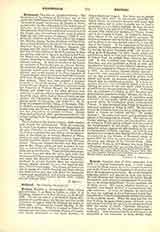

Kromer, MARTIN, a distinguished Polish bishop and historian; b. at Biecz in Galicia in 1512; d. at Heilsberg, Ermland (now East Prussia), on March 23, 1589, He was the son of a substantial citizen who, desirous of a public career for his son, sent him to the University of Cracow where he obtained his degree in philosophy. Afterwards he studied theology at Bologna and at Rome. When he returned to Poland he was appointed secretary to Gamrat, Bishop of Cracow, and shortly afterwards he was made secretary to Prince Sigismund August. The latter was so pleased with him that, when he afterwards ascended the Polish throne, he entrusted Kromer with many high official duties, and in order to enable him to receive promotion to even higher dignities the king elevated him in 1552 to the rank of a nobleman. Kromer was charged with diplomatic missions to Vienna, Rome, and to the Council of Trent. In Poland he had complete charge of the national archives, arranged the various documents and materials in systematic form, and in doing so devoted himself especially to the history of his country. At the suggestion of the king he utilized the studies made in arranging these archives by writing his great historical work, “De origine et rebus gestis Polonorum” in thirty books, which was published at Basle in 1555, and treated of the history of Poland from the earliest times down to the year 1506. It was translated into German by Heinrich Pantaleon and also published at Basle in 1562, and was likewise translated on two different occasions into Polish and published at Cologne in 1589 and at Cracow in 1611. In this history Kromer showed himself a keen critic, with a graceful style and polished Latinity, and he was particularly successful in setting forth clearly and lucidly the intricate political relations of Poland with the neighboring states. It is to be regretted, however, that his history ended without describing the events of the very epoch which he knew so well from his own participation therein. Following this, he published at Cologne in 1577 his great geographical and descriptive work, “Polonia, sive de situ, populis, moribus, magistratibus et republica regni Polonici”, in two books, which still remains an important source of information about contemporary Poland. It was translated into Polish by Kondratowicz and published at Wilna in 1853. He had even turned his attention to music, for in 1534 he had published a volume at Cracow entitled “De musica figurata”. He took a very active part in opposing the spread of Protestantism in Poland. His various polemical writings, his sermons, and his catechism were all written in Polish and in a simple style devoted to the enlightenment of the people; they formed an energetic protest against the introduction of the new Lutheran and Calvinistic doctrines. In 1570 he was appointed by Cardinal (then Bishop) Stanislaus Hosius as coadjutor in the Diocese of Ermland, where together with the latter he wrote popular works in explanation and defense of the Catholic Faith. After the death of Hosius in 1579 Kromer was made Bishop of Ermland, and held that see until he died in 1589.
ANDREW J. SHIPMAN

